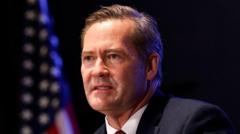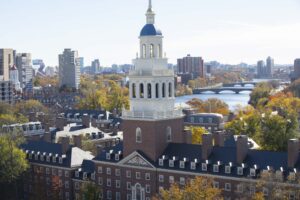In a developing situation, U.S. authorities have asserted that the recent denial of a French scientist's entry into the United States stemmed from concerns over confidential data, not his opinion of the Trump administration's policies.
U.S. Denies French Researcher's Entry Over Confidential Data, Not Political Views

U.S. Denies French Researcher's Entry Over Confidential Data, Not Political Views
U.S. officials clarify that a French scientist's denied entry was due to possession of confidential information, dismissing claims it was politically motivated.
The Los Alamos National Laboratory in New Mexico serves as a crucial site for nuclear research. Today's controversy involves a French researcher who was denied entry due to holding sensitive information on his electronic device, rather than political reasons. According to Tricia McLaughlin, a spokesperson for the Department of Homeland Security, the researcher, who specializes in outer space studies and has not been named, breached a nondisclosure agreement by bringing the data without permission.
French Minister for Higher Education, Philippe Baptiste, stated on a media platform that the scientist was blocked from entering the U.S. during his travel to a conference in Houston, because of his personal opinions regarding President Trump's scientific policies, which he had expressed in messages with colleagues.
However, McLaughlin firmly contradicted these assertions, placing emphasis on the confidential data as the sole reason for the refusal. Although she refrained from disclosing further specifics, the U.S. position remains unyielding against the narrative forwarded by French officials.
The scientist was working with France’s National Center for Scientific Research but has chosen not to comment on the situation as he remains in contact with his ministry. Baptiste acknowledged that every country has the authority to manage their borders but characterized the incident as "extraordinarily atypical," raising concerns about the implications for academic freedom.
Echoing these sentiments, the French Academy of Sciences issued a statement expressing that the deportation challenges essential academic freedoms pertaining to thought, expression, and mobility.
The circumstances surrounding this case highlight ongoing tensions around international academic collaboration and the intersection of politics and science on the global stage.
French Minister for Higher Education, Philippe Baptiste, stated on a media platform that the scientist was blocked from entering the U.S. during his travel to a conference in Houston, because of his personal opinions regarding President Trump's scientific policies, which he had expressed in messages with colleagues.
However, McLaughlin firmly contradicted these assertions, placing emphasis on the confidential data as the sole reason for the refusal. Although she refrained from disclosing further specifics, the U.S. position remains unyielding against the narrative forwarded by French officials.
The scientist was working with France’s National Center for Scientific Research but has chosen not to comment on the situation as he remains in contact with his ministry. Baptiste acknowledged that every country has the authority to manage their borders but characterized the incident as "extraordinarily atypical," raising concerns about the implications for academic freedom.
Echoing these sentiments, the French Academy of Sciences issued a statement expressing that the deportation challenges essential academic freedoms pertaining to thought, expression, and mobility.
The circumstances surrounding this case highlight ongoing tensions around international academic collaboration and the intersection of politics and science on the global stage.























